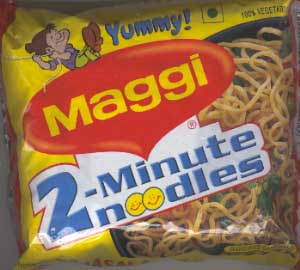Food regulators in India are attempting to manage “fear psychosis” among companies after banning Maggi in June last year for allegedly containing excessive lead.
 Maggi is an international brand of seasonings, instant soups, and noodles that originated in Switzerland and was acquired by Nestlé in 1947.
Maggi is an international brand of seasonings, instant soups, and noodles that originated in Switzerland and was acquired by Nestlé in 1947.
The Food Safety Standards Authority of India (FSSAI) has relaxed the product approval process for proprietary food products and nutraceuticals. It had also last week issued clarification about the standards of monosodium glutamate (MSG).
After the ban on Maggi in June last year, the food industry had complained about ‘inspector raj’. Even Food Processing Minister Harsimrat Kaur Badal had said that the regulator has created an environment of fear in the industry.
When asked about whether there is any fear psychosis after the Maggi ban incident, FSSAI CEO Pawan Agarwal said that it has taken number of steps to ease approval process without compromising on the quality norms of the products in order to address any fear among the industry.
 “… The fear psychosis has been curbed up to a large extent with various landmark initiatives taken by the FSSAI in easing the approval of food products and nutraceuticals,? Agarwal told PTI.
“… The fear psychosis has been curbed up to a large extent with various landmark initiatives taken by the FSSAI in easing the approval of food products and nutraceuticals,? Agarwal told PTI.
“But at the same time, utmost importance has also been given to ensuring quality of the food items,” Agarwal said.

 sachet may have caused the salmonella contamination, Nestlé said.
sachet may have caused the salmonella contamination, Nestlé said.